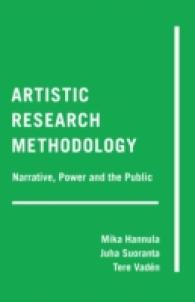Full Description
This open access volume draws on a multidimensional model of educational change, the book reviews the field of climate change education and identifies some of the areas in which past efforts have fallen short in supporting effective pedagogical change at scale. It then formulates an approach to engage university students and faculty in partnering with schools and adult education institutions and directly contribute innovative curricula on climate change. The approach is illustrated with several case studies which present curricula developed to support school-based innovation in the Middle East and in Guatemala, and adult education in Haiti and Pakistan, and educators preparation at the university level. The approach followed to develop innovative curriculum follows five steps:
1) What are the specific impacts of climate change in this jurisdiction? How do they impact various human populations?
2) What knowledge, dispositions and behaviors could mitigate the impact of climate change and are there ways in which changes in the behaviors of populations in this jurisdiction could slow down climate change?
3) What are the means of delivery to reach each of the specific populations in this jurisdiction who needs to be educated on climate change?
4) What curriculum can help educate each population?
5) What role can the institution we are collaborating with play in advancing climate change education in that jurisdiction?
The various chapters of the book present the conceptual foundation of these programs and illustrate how these programs respond to specific characteristics of local contexts. These programs focus in schools, non-formal settings and educator preparation institutions. The chapters offer examples of general value beyond the specific contexts for which they were designed, as they illustrate how in order to be optimally useful climate change education needs to be firmly grounded in the specifics of a context and responsive to that context.
Contents
Chapter 1. Climate Change Education and the role of Universities(Fernando M. Reimers).- Chapter 2. Learn to Lead: Developing Curricula that Foster Climate Change Leadership (Margaret Wang and David Rhodes).- Chapter 3. Creating a Culture of Shared Responsibility for Climate Action in Guatemala through Education (Lina Lopez Lalinde and Carrie Maierhofer).- Chapter 4. Building Climate change resilience in Haiti through educational radio programming (Ashley Bazin and Christelle Saintis).- Chapter 5. Adaptation, Migration, Advocacy. A Climate Change Curriculum for Out-of-School Children in Badin, Sindh (Natasha Japanwala).- Chapter 6. How Can Schools of Education Prepare Their Students to Teach Climate Change? from the Implementation of a Climate Curriculum at the Harvard Graduate School of Education (Annie Nam and Sueyoon Lee).








